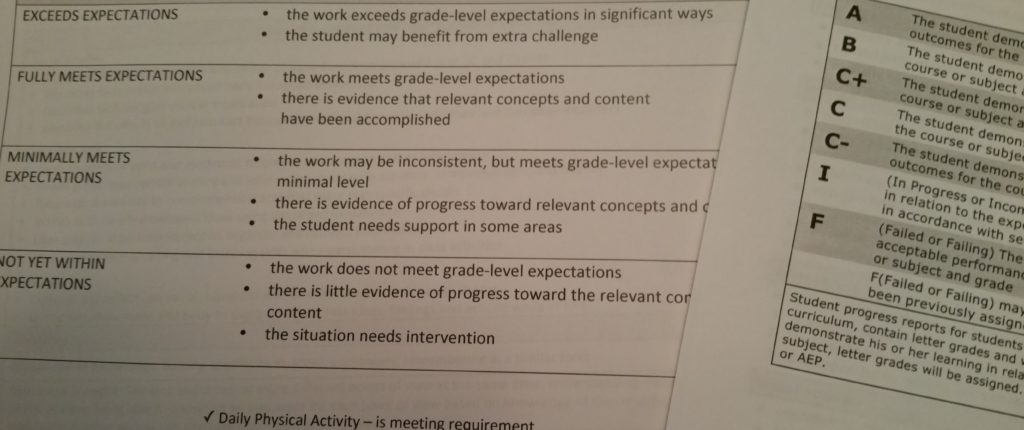
School is out and so are report cards! Some schools are no longer giving letter grades and are using other methods of assessment such as numbers, or “not yet within expectations, minimally meets expectations, fully meets expectations, exceeds expectations”. For parents who grew up with traditional letter grades, receiving a child’s report card without letter grades seems wrong, but what does the research say?
Research on Letter Grades
It’s always important to look at research vs. our gut feeling as research shows us the factual information.
Letter grades are a form of external motivation and a double form of external motivation when parents pay their children for A’s or buy them presents.
Sociologist and Educator, Alfie Kohn has written a lot on the topic of letter grades, including his book: Punished by Rewards: The Trouble with Gold Stars, Incentive Plans, A’s, Praise, and Other Bribes (Kohn 1993).
His main arguments agains letter grades are:
1) Letter grades tend to lower students’ interest in the learning process (Butler, 1987, Task-Involving and Ego-Involving Properties of Evaluation). Why? Because students become so focussed on the end point of the letter grades that they don’t fully engage in the learning process. Instead, they just focus on what they think they need to know or do to get the good grade and then be done.
2) When children receive external rewards, such as praise (or in the case of report cards – letter grades), children take less risks in hopes of protecting their status. Carol Dweck’s (the well-known and well-respected author of Mindset: The New Psychology of Success) research on this phenomenon is fascinating.
Dweck sent four female research assistants into New York fifth-grade classrooms. The researchers would take a single child out of the classroom for a nonverbal IQ test consisting of a series of puzzles—puzzles easy enough that all the children would do fairly well. Once the child finished the test, the researchers told each student his score, then gave him a single line of praise.
Randomly divided into groups, some were praised for their intelligence. They were told, “You must be smart at this.” Other students were praised for their effort: “You must have worked really hard.”
Why just a single line of praise? “We wanted to see how sensitive children were,” Dweck explained. “We had a hunch that one line might be enough to see an effect.”
Then the students were given a choice of test for the second round. One choice was a test that would be more difficult than the first, but the researchers told the kids that they’d learn a lot from attempting the puzzles.
The other choice, Dweck’s team explained, was an easy test, just like the first. Of those praised for their effort, 90 percent chose the harder set of puzzles. Of those praised for their intelligence, a majority chose the easy test. The “smart” kids took the cop-out.
(NurtureShock: New Thinking About Children
, Po Bronson & Ashley Merryman)
3) Grades tend to lower the depth and creativity of students’ thinking (Butler, 1988, Enhancing and Undermining Intrinsic Motivation). Research has shown that highest achievement occurs, when there is purely qualitative feedback with comments.
I am a certified teacher, as well as a counsellor so I think about the topic of assessment a lot, especially around report-card time. I can think of many anecdotal stories of adults who’ve described themselves as not being very “smart” in school, only to discover in adulthood, that they were actually very “smart” in many areas but it was too late for them to go back and do school all over again.
Recently, I ran into a mom who told me her son was giving up soccer because he hadn’t been chosen for the premier team in his age group and therefore this meant, from his perspective, that he wasn’t good at soccer and so he didn’t want to play anymore! This is what Carol Dweck describes as experiences which create “fixed mindsets”.
Some people think that by not giving letter grades, this feeds into a culture of “coddling”. I disagree. I certainly don’t believe in coddling and I do believe children should fall and learn to get up, but I find it very sad that letter grades can be the breaking point as to whether or not someone thinks they’re “smart” or “stupid”, or willing to take academic risks or not.
Personally, I wish that the assessment process was completely qualitative – purely based on a meeting with the teacher and comments. I would love to see each student (elementary and high school) put together a portfolio for each subject and go over it with the teacher on an individual basis, whilst setting goals for him/herself.
Daniel Pink, author of the best seller, Drive: The Surprising Truth About What Motivates Us, has found that the three greatest ingredients for motivation are: mastery, autonomy and purpose. An accountability meeting with one’s teacher would support mastery, autonomy and purpose. Imagine if our children were to have these kinds of meetings with their teacher that they may one day have in their careers. Imagine if our children followed this business model of an accountability meeting:
C – Clarify goals for the accountability meeting
L – Link back to prior meeting for accountability
E – Explore options and possibilities
A – Accelerate progress by removing barriers
R – Recap the session and confirm commitments
(CLEAR model from Accountability Experts Inc.)
Imagine if, for example in elementary schools, and when possible, teachers could meet with one student each day (during silent reading time) and have an accountability meeting. This could mean 3-5 meetings per school year for each student.
We’re in a time of change with educational assessment. I’d love to hear your thoughts and continue this conversation with you on my Facebook SharonSelby Child and Family Counselling page.
I hope the school year has finished well for you and your kids,
Happy summer holidays!
Warmly,
PS. Are you curious about Why Children Lie & What To Do About It? Click here to find my Free Report that reveals the answers.
Want to Connect?
Subscribe now to receive free weekly parenting tips and inspiration.







